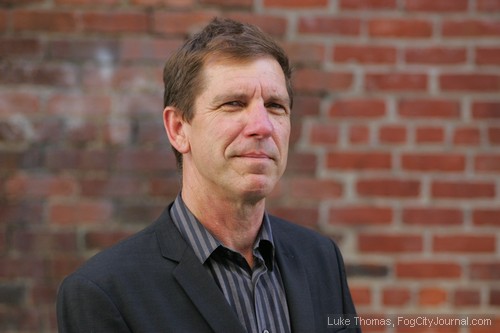
Despite being exposed for using phony bylines, the San Francisco Chronicle says it will continue to publish local news content generated by overseas news mills. Screenshot courtesy SFGate.com.
July 16, 2012
Managers of the Hearst Corp.’s San Francisco Chronicle plan to continue using a controversial overseas content mill that fabricated bylines.
Despite a protest by the Media Workers Guild, which represents journalists and other staff members at the Chronicle, editor Ward Bushee said the Chronicle will continue buying copy from BlockShopper, a private company whose business practices were revealed on the radio program This American Life.
BlockShopper is owned by Journatic, which outsources work to contract writers overseas for $2 – $12 a story, then slaps on American-sounding bylines to create the illusion that the hyper-local content is in fact produced by local reporters.
The product has clear appeal to news organizations in pursuit of local advertising dollars. Journatic’s clients include the Houston Chronicle, the Chicago Tribune and Newsday. BlockShopper peddles “local” real estate stories.
Pacific Media Workers Guild executive officer Carl Hall lodged a protest with Chronicle management soon after the news broke about the phony bylines. Later last week, Bushee met with Guild international vice president Michael Cabanatuan, a Chronicle reporter and former president of the San Francisco-based Pacific Media Workers Guild.
Bushee told Cabanatuan the Chronicle preferred to devote its newsroom resources to higher-profile coverage than the real estate features and business blurbs BlockShopper provided. Steps will be taken, apparently, to end the fictitious credits, but Hall said he wasn’t buying it.
“This level of deception would get our members fired,” Hall said. “The reaction from the Chronicle seems to be oddly muted. Who knew about it? Who decided it was OK?”

Pacific Media Workers Guild Executive Director Carl Hall. Photo by Luke Thomas.
His message for Bushee is a simple one: “They should can that outfit and hire journalists to do journalism.”
Any section edited by news staff should be held to the same standards as the rest of the paper, Hall said. Otherwise, lower standards in one part of the paper and its website degrade the entire operation.
“People start wondering if the staffers are real journalists,” Hall said. “They are willfully deceiving readers.”
The story on This American Life, “Forgive Us Our Press Passes,” suggested that even trusted bulwarks in the news business have taken their cues from American manufacturers who offshore manufacturing to countries where jobs are low pay and high stress.
“Journalism is supposed to be a local institution written by people who care about what’s going on there,” former BlockShopper and Journatic copy editor Ryan Smith told This American Life producer Sarah Koenig. “This is sort of a tattered product that’s written overseas, half-heartedly edited (in the U.S.) and just kind of slapped on the page. There’s something inauthentic about the whole process. The picking of these fake names for writers in the Philippines is just a symptom of that.”
The Journatic story broke when Smith suffered a crisis of conscience. Smith, who earned $10 an hour for cleaning up copy produced overseas, took his story to Chicago Reader reporter Michael Miner.
Miner, curious about how well BlockShopper delivered on its promise to divulge “tantalizing details such as what your new neighbor does for a living and how much he or she earns,” consulted the site for information about properties he was familiar with.
“The information I got back was bizarrely wrong just often enough to keep me from having any faith in anything the site told me,” he writes
That may have had something to do with the compensation: BlockShopper ads seeking freelance writers say they can expect to pocket “roughly” $12 an hour: $4 for a story that takes 20 minutes to write, $2 for one that consumes 10 minutes.
“With businesses that don’t understand the basic tenets of journalism, things like this are bound to happen,” said Michelle Devera, chair of the Chronicle Guild unit. “It’s sad really, when you think of all the longtime, quality journalists who’ve been laid off. This is a no-brainer. Without credibility, you have nothing. Without integrity, you are nothing.”
For Hall, longtime Chronicle science writer, the revelation hurt.
“I can’t believe the Chronicle, where I worked for 22 years, would countenance this kind of thing,” he said.
The Chron ran two stories several days ago – appropriately enough, with no bylines. Its managers said they were disinclined to end its relationship with BlockShopper because of a mere ethics breach, even one that involved lying to readers.
“Obviously, we’re disappointed that our internal investigation uncovered these pseudonyms,” the story quoted Chronicle President Mark Adkins as saying. “We will work with BlockShopper to make sure these issues are resolved.”
Under the reassuring headline, “Content vendor Journatic’s work checked,” a second article revealed that by running invented bylines, Journatic – not to worry – was simply “trying to achieve better search engine ranking and insulate its writers from reader complaints.”
BlockShopper real estate stories run personal information about sellers and homebuyers. They often spur lawsuits, said Brian Timpone, co-founder of BlockShopper and CEO of its parent company Journatic. So the phony-byline strategy was used as a legal shield, rather than invest in the more traditional defense against litigation: quality journalism.
“Our writers were being threatened individually by the subjects of stories,” Timpone said in an interview with Poynter. “We did it to protect them from the threats.”
The company has moved toward generic bylines, like “special to Newsday,” or “Neighborhood News Service.”
But that only eliminates one part of a larger fraud, say editors of Bay Area hyper-local sites.
“The use of writers in other countries to cover local news is worrisome, because people who live in the community know it best,” said Michael Stoll, founder and executive director of SF Public Press, which covers San Francisco exclusively. “Journalism is not completely reducible to mass production and offshoring.”
In addition, reporters “may get the facts wrong because people who do not live here may misunderstand the local context of news,” he said.
“Our value is in our authenticity, our relationship with our audience,” said Susan Mernit, editor and publisher of Oakland Local. “The value of hyper-local news is having it written by people who are invested in the community.”
Bill Snyder, freelance journalist and vice chair of the Guild Freelance Unit, said there is no overestimating the ravaging effects of outsourcing on journalists.
“I’ve covered outsourcing and the destructive effect is has had on the information technology industry for years,” he said. “Naively, I never imagined that off-shoring would become an issue for journalists. How wrong I was.
“Could anything make it clearer that freelancers and staff journalists are under the same gun?


 The Hunger Site
The Hunger Site
July 17, 2013 at 6:33 pm
Hmm, what the cheap-as@ content mills here in the USA aren’t good enough for the SF Chronicle? Surely doesn’t make me want to pay to subscribe to that paper. Cannot imagine a progressive city like San Fran would have any residents who would be wiling to buy that shi# .So, you made your bed SF Chronicle, now lie in it. … Hate to say it, but I’m a writer and content mills are insanely unfair and pay slave wages while using contractors without respecting anyone’s business rights but their own. Screw you, Hearst. Hope there’s a lawsuit so all writers can get some justice and get their fair wages back.
July 18, 2012 at 11:07 am
A total abrogation of journalistic ethics, as were once practiced. Hearst and its lickspittle managers would be perfectly happy to sell the local reader a story written by a Bangaladeshi for $1 rather than a Chronicle writer who is a paid member of the Media Workers Guild. Well, the Romney voters have to come from somewhere, I guess
July 17, 2012 at 9:55 am
Great piece —
July 17, 2012 at 9:24 am
C’mon guys, give the Voice of the West; aka The Mouthpiece of Moloch; a break. They have few, if any, journalists or investigative reporters left on staff. They have to find copy apart from Macy’s ads and obituaries to fill the pages of their bird cage liner.
July 19, 2012 at 9:56 am
Aw/ c’mon, Patrick, they’ve got C.W. Nevius, Matier’n Ross, Heather Knight, and, don’t forget, Willie Brown.
July 19, 2012 at 10:18 am
Thanks Ann, how could I overlook such luminaries !!
August 6, 2012 at 8:50 pm
Debra Saunders!
July 16, 2012 at 11:03 pm
Great piece about the latest black eye besmirching the Chron. I saw what was written at the Poynter site today and though it didn’t mention the SF Chron along with the Houston Chronicle and that paper’s decision to keep running the news mill content, in my gut I suspected our local Hearst rag would follow the Texas rag’s thinking.
News mill content aside, the original crappy (pun intended) coverage getting into the Chron these days ain’t nothing to write home about.
I blogged last week about a few problems with the Chron’s latest demonizing piece about the smelly and strung out homeless and poor folks in public spaces, this time at the BART plazas at 16th and Mission. Check this out: http://mpetrelis.blogspot.com/2012/07/sf-chron-omits-gay-supe-from-piece-on.html .Some friends and I have spoken about organizing various individuals and constituencies to stage a one-hour picket at the Chron’s HQ on 5th and Mission. If there’s any interest is this idea, lemme know. There needs to be visible opposition to a lot of what is wrong with this major daily.
July 16, 2012 at 2:39 pm
Great story! I did not know about the Guild’s complaints or the response to them. One update: The Tribune has suspended work with Journatic after it discovered a plagiarized story last week (see http://journ.us/Mskac9). Also, Hearst told us it is reviewing content from Journatic after we revealed hundreds of stories with fake bylines on the Houston Chronicle’s Ultimate websites (see http://journ.us/LVf4eI). Glad to know you’re following this closely on the West Coast. Thanks, Julie Moos, Director of Poynter Online